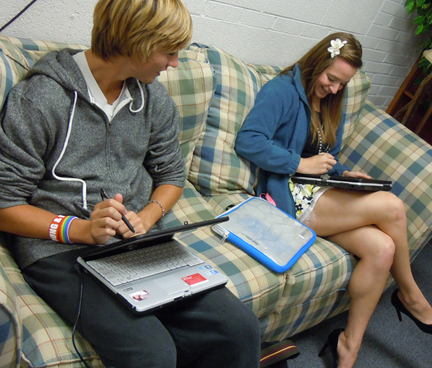Thayer Central district hands out laptops

Thayer Central students are making a giant technological leap forward this week as they claim “ownership” of brand new Fujitsu laptop computers. Ownership in that each student will have their own compact, toteable computer to use in the classroom, at the library, in the bleachers at sporting events, at home; virtually anywhere they want to go.
Although the school district actually owns the portable computers, the students lay claim to them throughout their high school careers, all the way through graduation.
“It’s our one-to-one program,” says Thayer Central Superintendent Drew Harris. “One computer for each student.” He added that one-to-one programs have been around for about ten years, but security, content control and policy issues concerned him enough to wait to see if the program was indeed beneficial to the district.
In the meantime, the district’s static computers (non-portable desktop models) had been replaced and were serving the needs of the teachers and students.
“In the last decade, however, content filtering has dramatically improved as well as the district’s ability to control that aspect of it,” Harris said. Also, enough time has passed that the static labs were in need of upgrading, a cost administrators were in the process of discussing, which is how the one-to-one program found its way to the table, he said.
So, about a year ago, a committee of four teachers and three administrators was formed to research the one-to-one initiative, visit other Nebraska schools to view implementation of the program and research hardware to find the right computer to fit the needs of Thayer Central.
“We also studied various policies from a number of schools to develop a policy of our own,” he said.
Some of the funding for the laptops comes from REAP and ESU funds while the rest is through a three-year lease program at Thayer County Bank. The wireless units, which sport protective sleeves and personalized skins, cost $1,350 each; entire program costs were $180,000.
“We upgraded our wireless network two years ago,” Harris said, “so our system can handle the load.” Students do not have administrative rights to their computers meaning that even though they can take them off the school’s premises, they can’t add programs, download materials, or access sites online that are normally restricted at school.
Parents are also required to have some form of insurance if their child is planning to take the computer off of school property, otherwise, the computers are stored at the school.
The district will begin phasing out the static labs; one will be kept for testing purposes, Harris said. And, at the time of graduation, each student will be given the option of purchasing their computer.
“We’re excited about implementing this program into the district,” Harris said, “We believe it gives kids more opportunities to be engaged in learning.”


